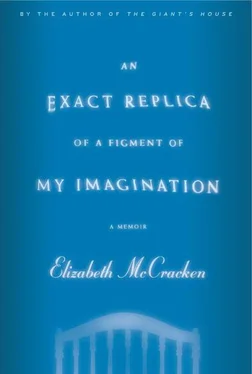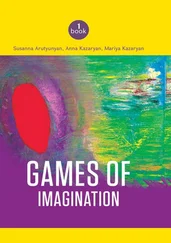“I want to pry that plaque off with a knife,” said Edward as we left. “I don’t want the word Bordeaux anywhere near him.”
We got in a car and headed for the rocade, the highway that girdled the city, for the last time in our lives.
When I was a teenager in Boston, a man on the subway handed me a card printed with tiny pictures of hands spelling out the alphabet in sign language. I AM DEAF, said the card. You were supposed to give the man some money in exchange.
I have thought of that card ever since, during difficult times, mine or someone else’s: surely when tragedy has struck you dumb, you should be given a stack of cards that explain it for you. When Pudding died, I wanted my stack. I still want it. My first child was stillborn, it would say on the front. It remains the hardest thing for me to explain, even now, or maybe I mean especially now — now that his death feels like a non sequitur. My first child was stillborn . I want people to know but I don’t want to say it aloud. People don’t like to hear it but I think they might not mind reading it on a card.
I could have taken my cards, translated into French, to the stores of Duras, where the baker, the butcher, the dry cleaner, the grocery store ladies, had seen me growing bigger and bigger over the months: I couldn’t bear the idea of them seeing me deflated and asking after the baby. “Voilà,” I’d say, and hand over a card. I could have given a card to the imperious man at immigration in Portsmouth who almost denied me entry into England. To the waiter at the curry house that summer who was always mean to us. To the receptionist at the ob-gyn practice in Saratoga Springs at my first visit. To the nurses who asked me why I was scheduled for such close prenatal monitoring.
To every single person who noticed I was pregnant the second time, and said, “Congratulations! Is this your first?”
To every person who peeks into the stroller now and says the same thing.
Every day of my life, I think, I’ll meet someone and be struck dumb, and all I’ll have to do is reach in my pocket.
This book, I am just thinking now, is that card.
When I called my friend Ann the first time after Pudding died, she immediately asked what she could do, and then did everything, and then kept asking, and she sent out an e-mail to tell people I hadn’t told that was so beautiful — though I have never read it — that I got the most beautiful condolence notes in response. Wendy burst into hysterical tears at the sound of my voice and asked me questions until I’d told the whole story. “Was he a beautiful baby?” she wanted to know, and I wondered how she knew to ask: she was the only one who did. Margi said, “Oh, Elizabeth, please know that if any of us could absorb your pain for you, we would,” and then laughed at all my dark jokes. Bruce, remembering something just as terrible that had happened to him decades before, wrote, “There is no way for such an event to leave you who you are.” Patti, who has seen as much sorrow as anyone I know, was an extraordinary combination of complete sympathy and complete comprehension. My brother said, at the end of a long conversation, “Well, I guess as a family we’ve been pretty lucky that we haven’t had something awful happen before.” My sister-in-law Catherine texted, Poor poor darling you .
Somehow every one of these things happened at exactly the right time for me. This is why you need everyone you know after a disaster, because there is not one right response. It’s what paralyzes people around the grief-stricken, of course, the idea that there are right things to say and wrong things and it’s better to say nothing than something clumsy.
I needed all of it, direct comfort, hearsay grief. Edward’s great friend Claudia’s husband, Arno, a stage manager and perhaps the calmest man I’ve ever met, burst into tears on the phone when Edward called, and when Ann called my friends Jonathan and Lib, Jonathan did, too. “Oh,” Ann said to me, “to hear that big man cry.” I couldn’t have borne listening myself, to him or Arno, but to know that they did — it felt as though they had taken part of the weeping weight from my shoulders. Of course I cried an awful lot, but I also regretted every stupid time I’d ever cried in my life before over nothing, days as a teenager I’d wept myself sick and couldn’t exactly remember why, when I should have saved up. Now, in Tipperary and near Harvard Square, big men were crying for us. Before this I’d imagined that professional mourners, people hired to cry at funerals, were always little old ethnic grandmothers, maybe because the first funeral I’d been to was for a fifth-grade classmate named Paula Leone, and her Italian aunts had howled at the graveside.
“They shouldn’t be old women,” I told Edward in Bordeaux. “They should be big men, a whole line of them, crying.”
Idon’t know what to say, people wrote, or, Words fail.
What amazed me about all the notes I got — mostly through e-mail, because who knew how to find me? — was how people did know what to say, how words didn’t fail. Even the words words fail comforted me. Before Pudding died, I’d thought condolence notes were simply small bits of old-fashioned etiquette, important but universally acknowledged as inadequate gestures. Now they felt like oxygen, and only now do I fully understand why: to know that other people were sad made Pudding more real. My friend Rob e-mailed me first, a beautiful and straightforward vow to do anything he could to help me. Some people apologized for sending sympathy through the ether; some overnighted notes; it made no difference to me. I read them, and reread them. They made me cry, which helped. They moved me, that is to say, they felt physical, they budged me from the sodden self-disintegrating lump I otherwise was. As I was going mad from grief, the worst of it was that sometimes I believed I was making it all up. Here was some proof that I wasn’t.
One day Ann wrote to say that people, even people who didn’t know me, had asked what they could do for me.
“They could write,” I told her. I considered this a sign of my essential mental health, that I could both think of something that would make me feel better and ask for it.
The English Department head at Skidmore, Linda Simon, was one of the people who’d asked, and soon enough my e-mail box filled up with messages from my future colleagues. I’d met some but not others, and every single message meant the world. One, from a famous writer who taught in the department, was so eloquent that it inspired in me the only moment of true denial I remember from that terrible time: I thought, I’ll save this, and show it to Pudding when he’s older: it’ll really mean something to him .
People speak of losing friends when someone dear to them dies, but we were lucky. I lost only one friend, and possibly she doesn’t even know it yet, and probably I’d lost her long before. Her mother had died when this friend was a teenager, her father died when she was in her thirties. Frankly, I’d been good to her after her father’s death, though by the time Pudding died we were no longer as close as we’d been. One of my best friends called to tell her my bad news and then e-mailed to say that he had done so.
I waited to hear from her. And waited.
It took three months. That would have been all right if she’d said, I didn’t know what to say, or I’m sorry, I’ve been trying to find the words .
“I was hoping to speak to you,” she wrote, “or be able to send a paper letter, but I don’t have a number or address for you, and I simply couldn’t wait any longer.”
Читать дальше












